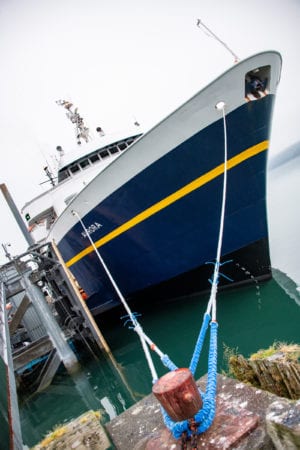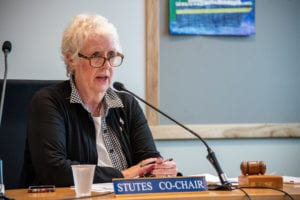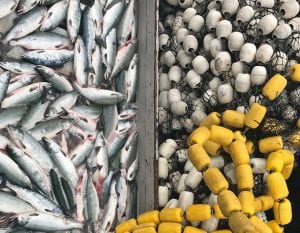
Dear Friends and Neighbors,
As the dust settles after the second special session, I wanted to update you on some of the Governor’s vetoes in HB 2001, what was restored in that bill, my thoughts on a third special session, as well as a 2016 pink salmon disaster relief update.
Alaska Marine Highway
I’ll start with the most vital issue to Cordovans, which is the winter ferry schedule. Along with all of you, I was extremely disappointed that Governor Dunleavy chose to veto the additional $5 million I had secured for the Alaska Marine Highway System (AMHS). Prior to the veto, I had commitments from AMHS that the bulk of that funding would be used in my district with a focus on winter service from Cordova to Whitter. Make no mistake, the veto of that funding was a veto of your winter ferry service. I find it extremely disingenuous that the administration held public comments on the draft winter schedule, heard the outcry from coastal communities, and then the governor proceeded to veto the funding intended to fix the problem.
On the Office of Management and Budget’s (OMB) website, the governor justifies his veto by stating that “this was a legislative addition, but it is premature until the department and their consultant finalize the review of the AMHS.” So, after holding public comment on the winter schedule, seeing over 260 community members attend the recent House Transportation Committee hearing in Cordova on said schedule, and with service about to end in several weeks’ time, it is “premature” to allow funding to move forward that would address the issue? It is clear to me that despite any claims of listening to Alaskans, the governor is not listening to rural Alaska.
I know that Cordova is understandably anxious to see a new schedule. As of this morning, AMHS anticipated that a new schedule should be out in “early” September. I’ll be honest, I am not encouraged with my recent discussions with AMHS. The veto of the $5 million, the cost of the recent strike, as well as ongoing union negotiations have severely limited the options for increasing winter service. However, I have another meeting setup with AMHS later this week and I am trying to pull every lever I can. I’ll update you as soon as I know more.
Other vetoes
The governor’s vetoes in HB 2001 were, honestly, a mixed bag, with the governor allowing some previously vetoed items to be restored, while vetoing others a second time. Items vetoed in the bill totaled $222 million. Notable second-time vetoes included $49 million for school bond debt reimbursement, $19.7 million from the Regional Education Attendance Area and Small Municipal School District (REA) Fund, $50 million from Medicaid funding, $27 million from Medicaid coverage for adult dental services, $6.1 million from behavioral health treatment recovery grants, $30 million in revenue sharing for communities, $7.4 million from adult public assistance, $3 million from the VPSO Program, $2.7 million for public broadcasting, and $3.4 million for the Ocean Ranger program.
Restored vetoes

On a positive note, the Legislature was able to restore many of the original vetoes in HB 2001. Restored items included $110 million for the University of Alaska, $20.7 million for the Senior Benefits Program, $8.8 million for early education programs ($6.8 million for Head Start, $320,000 for Best Beginnings, and $474,700 for Parents as Teachers), $670,000 for the Online with Libraries program, $138,200 for the Live Homework Help program, $759,000 for Alaska Legal Services (ALSC), $3.8 million for the Alaska State Council on the Arts, $100,000 for a veterans’ services officer, $2.2 million for Human Services Matching Grants and Community Initiative Grants, $533,500 to reopen the Department of Law office in Utqiagvik, and $2.7 million for agricultural programs.
HB 2001 was a mixed bag. The Legislature was able to restore some very damaging vetoes, but the governor vetoed others a second time and eliminated our $5 million increase to AMHS operations.
A third special session?
The governor has announced plans to call a third special session with the expressed purpose of appropriating an additional $1,400 to the PFD. My thoughts on that are the same as they have been all year. I know most of you have read my previous updates, so I will try not to repeat myself; however, the state cannot afford a $3,000 PFD. This is clearly evidenced by the governor’s dismantling of rural Alaska to pay a super-sized dividend. Cordova has been pretty clear with me where its priorities lie. Although we all value the PFD, the consensus I am getting from my district, and Cordova in particular, is that my constituents would rather maintain the services that make our communities a good place to live, work, and play and have a moderately-sized PFD than they would a very large PFD with no services. I do not support an additional $1,400 for the PFD because it is extremely irresponsible to present and future Alaskans. The governor has not issued a special session proclamation yet and only time will tell whether he calls us back in or not.
What’s next?
Alaska needs a comprehensive plan that includes looking at oil tax reform, some form of a broad-based tax, continued budget reductions, and changes to the PFD. That is the plan that will preserve communities like Cordova for generations to come, not the “slash services to nothing and pay a large PFD” plan. Although the governor relented on certain vetoes for now, the only thing that really changed was his timetable. His plan is still the same and he will be seeking further draconian reductions in the three years to follow.
This has been a very hard year for Alaska and the communities I represent. At times, it has been hard to see the light at the end of the tunnel. However, I believe that Alaskans have had a clear view at what the administration’s vision for the state actually looks like and that, collectively, we have wholeheartedly rejected that vision. It is a vision of a lesser, depleted rural Alaska and it is something I oppose with every fiber of my being.
The path forward will not be easy, but as long as I am your representative, I will continue to fight for an Alaska that supports communities like Cordova, Yakutat, Kodiak and Seldovia. Public opinion has firmly shifted away from the governor and his agenda, and I hope that, over time, this will continue to curb the governor away from the destructive course he has charted for Alaska.
Pink salmon disaster relief update

I want to take a brief moment to discuss the 2016 Pink salmon disaster relief funding. As most of you are probably aware, correspondence from the Pacific States Marine Fisheries Commission (PSMFC) has been arriving in fishery participants’ mailboxes over the past few weeks. I am glad to see the process is finally moving along. If you do not receive paperwork shortly but think you are eligible, reach out to PSMFC at 1-888-517-7262 to receive instructions to start an appeal. I have been told that it can be several days or more before you get a return call from this number.
I am keenly aware of several issues regarding how the amounts for reimbursement were calculated. In particular, the way the 5-year average was calculated for people with a partial catch history, as well as the decision to calculate that average using all of a person’s limited entry permits instead of just that gear type resulted in significantly smaller payments for some who, for instance, are applying for 2016 seine reimbursement but may have fished a gillnet permit in 2012 and/or only fished 2014 seine. In some instances, having no catch history at all resulted in a much higher payment.
If you believe that you fall in this category, or have another issue to raise, please reach out to my office at 907-465-3271 as I am currently communicating our concerns to ADF&G, our congressional delegation, and PSMFC. My hope is that the department and our congressional delegation will join me in contacting PSMFC to make it clear that there were some oversights and that these particular issues should be addressed favorably in the appeals process.
On its website (psmfc.org/fishery-disaster-programs), PSMFC states that paperwork must be returned to the Commission office by October 31, 2019 to be considered for payment. It would be a good idea to have any appeal filed long before that date. The website also has a link to follow for additional information and FAQs regarding the process.
If you are filing an appeal, please contact my office. Our ability to contact PSMFC directly is limited but we have indirect avenues, and we will be happy to assist you through the process in any way we can. In the meantime, I am doing what I can to make ADF&G and our congressional delegation aware of any problems and advocate for flexibility and a human element in the appeals process.
Remember I work for you, please contact me anytime to discuss these or any other issues that are important to you and your family.
Sincerely,
Louise Stutes





